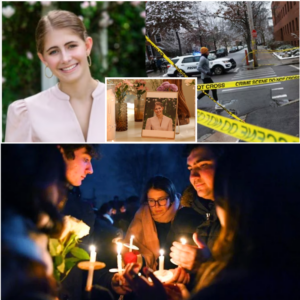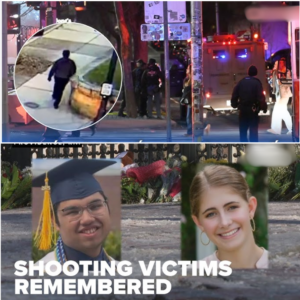The knock on the door was meant to be a mother’s fierce defense, a simple act of protection in a neighborhood where children’s laughter should echo freely. But on June 2, 2023, that knock shattered lives forever. Ajike “AJ” Shantrell Owens, a 35-year-old Black mother of four, stood on the porch of her white neighbor Susan Lorincz, demanding answers after Lorincz hurled a roller skate at one of AJ’s sons and swung an umbrella at another. What followed was a single gunshot through a locked wooden door – a bullet that pierced AJ’s chest and her family’s heart. AJ collapsed into her children’s arms, her final words a gasp: “I’m okay, babies.” She wasn’t.
In the sweltering Florida heat, as sirens wailed and neighbors gathered in stunned silence, Pamela Dias – AJ’s mother – arrived to a scene of unimaginable horror. Her daughter, the vibrant “supermom” who juggled football practices, PTA meetings, and a job at a local salon, lay lifeless on the pavement. “She was our compass,” Pamela recalls, her voice a quiet storm during a recent interview at her Ocala home, walls lined with photos of AJ’s infectious smile and her four children – Isaac (now 12), Israel (10), Afrika (9), and Titus (3). “AJ lived for those kids. She taught them to stand tall, to love fiercely. And in her last moment, she was still protecting them.”
The Owens-Dias family – Pamela, her husband Mark, AJ’s siblings, and the grandchildren now under her roof – was torn asunder by this act of senseless violence. But from the ashes of grief, they are weaving a tapestry of resilience: the Standing in the Gap Fund, a nonprofit born of raw pain, dedicated to bridging the chasms of gun violence, racial injustice, and community trauma. In a nation reeling from over 43,000 gun deaths in 2024 alone – disproportionately borne by Black families – the Diases are not just mourning. They are marching, transforming a personal apocalypse into a national clarion call for prevention, healing, and hope. Their story isn’t one of defeat; it’s a defiant roar: We rise, so others won’t fall.
The Spark: A Mother’s Stand and a Bullet’s Betrayal
Ocala, a horse-country enclave in Marion County, Florida, prides itself on Southern charm and quiet streets. But beneath the Spanish moss and picket fences simmered tensions that had festered for years. Since 2021, Susan Lorincz, 58 at the time, had dialed 911 at least six times, railing against “noisy Black kids” playing in a vacant lot near her Silver Road apartment. Bodycam footage later revealed her venom: racial slurs hurled from her porch, accusations of “trespassing” over innocent games of tag. AJ’s children – ages 3 to 12 then – bore the brunt, their joy twisted into fear by a neighbor who saw threats in their laughter.
The flashpoint came on that fateful Friday evening. AJ’s boys, Israel and Isaac, were retrieving a lost tablet from the lot when Lorincz snatched it, then lobbed a roller skate at Israel’s foot, cracking the screen and drawing blood. As the brothers approached to protest, she brandished an umbrella like a weapon, swinging wildly. Terrified, they raced home to AJ, who – ever the protector – marched across the street, children in tow, fists clenched not in rage but resolve. “Give me back my babies’ things,” she demanded, pounding on the door. Inside, Lorincz dialed 911: “She’s here, threatening to kill me!” Two minutes later, a .380-caliber round tore through the door, striking AJ in the chest.
Eyewitnesses – including AJ’s own children – described chaos: Isaac, 9 then, watched his mother crumple, blood pooling as he screamed for help. Israel, 7, dialed a neighbor’s doorbell cam, begging, “My mom’s been shot!” Titus, the toddler, wailed in confusion. Afrika, the only girl, clung to her brothers, too young to grasp the void opening beneath them. Paramedics arrived too late; AJ was pronounced dead at AdventHealth Ocala, her body a stark indictment of unchecked fear and firepower.
Lorincz barricaded herself inside, claiming self-defense under Florida’s “Stand Your Ground” law – a statute born in 2005 that empowers deadly force without retreat if one perceives a threat. But investigators saw no such peril: AJ was unarmed, yards away, her “pounding” mere maternal fury. Prior calls painted Lorincz as the aggressor, her paranoia laced with bigotry. Yet, no arrest came for four days, igniting protests that rippled from Ocala’s streets to national headlines. Civil rights attorney Ben Crump, representing the family, thundered: “This is the new lynching – a Black mother gunned down for knocking on a door.” Comparisons to Trayvon Martin and Ahmaud Arbery flooded social media, hashtags like #JusticeForAJ trending with cries of systemic bias.
Pamela, 62, a retired educator and pillar of Immerse Church of Ocala, arrived amid the frenzy. “I fell to my knees,” she says, eyes distant. “Not my baby. Not like this.” Mark, her steadfast husband, shielded the grandchildren from flashing cameras. AJ’s sister, Keisha, coordinated with Crump, while the children – scarred witnesses – retreated into silence. The family’s first nights were a blur of funeral planning and futile “why”s: Why did Lorincz’s complaints go unchecked? Why did “Stand Your Ground” shield a shooter but not a mother? Why, in a nation of 400 million guns, must Black joy be policed to death?
The GoFundMe launched that week exploded, raising over $150,000 in days – enough for immediate needs, but a pittance against the lifetime of therapy, lost wages, and shattered futures ahead. Donations poured from strangers moved by AJ’s story: a Texas mom of five, a teacher in Chicago, a retiree in Seattle. “Your daughter’s light must shine on,” one wrote. But money couldn’t mend the guilt gnawing at the boys – Isaac blaming his tale-telling, Israel his failed CPR attempts. Titus asked daily, “When Mommy coming home?” Afrika drew pictures of a family whole, colors bleeding into black.
Descent into Darkness: The Weight of Collective Wounds
Grief in the Owens-Dias home wasn’t a wave; it was a tsunami, crashing without mercy. Pamela, who had buried her own mother young, now cradled four generations’ pain under one roof. “The house echoes with her absence,” she confides over chamomile tea, the scent AJ loved. Mornings brought panic attacks; nights, nightmares of doorbells ringing like gunshots. Mark, a soft-spoken mechanic, buried himself in grandkids’ routines – soccer shuttles, bedtime stories – but confessed to Pamela, “I fix cars, not hearts.” Keisha, AJ’s confidante, quit her job to homeschool the children, her laughter replaced by vigilance.
The trauma rippled outward. Ocala’s Black community, already scarred by 2023’s spike in gun homicides (up 15% statewide), felt the sting anew. Protests swelled to hundreds, blocking intersections with chants: “Black lives matter – even at play!” Faith leaders like Rev. Mark Hilditch of Immerse Church hosted vigils, candles flickering against the apartment complex’s chain-link fence, now a makeshift memorial of teddy bears and “AJ’s Angels” balloons. National outlets dissected the case: CNN aired bodycam exclusives; Netflix greenlit The Perfect Neighbor, a 2025 Sundance premiere using raw 911 audio and interviews to expose the “Karen” archetype’s deadly edge.
Psychologically, the family navigated a minefield. The CDC reports gun violence survivors face PTSD rates triple the national average, with Black families enduring compounded racial trauma – “weathering,” as researchers call it, where chronic stress erodes health like acid rain. For the children, Childhelp counselors diagnosed acute grief: Isaac’s bedwetting returned; Israel withdrew into video games; Afrika’s drawings turned somber; Titus, sensing the shift, clung like a shadow. “They blame themselves,” Pamela told reporters post-sentencing. “My grandson saw her fall. He thinks it’s his fault she’ll never tuck them in again.”
Isolation deepened the cut. Friends faded, unsure how to bridge the chasm; holidays hollowed into rituals of remembrance – Thanksgiving without AJ’s mac-and-cheese, birthdays marked by her favorite red velvet cake. Bureaucracy added insult: Victim compensation forms demanded receipts for “intangible losses” like therapy; media scrutiny turned sacred pain public. “We weren’t just grieving AJ,” Keisha says. “We were grieving the world that let this happen – laws that arm hate, systems that delay justice.”
Yet, in this abyss, seeds of defiance stirred. At AJ’s June 2023 funeral – attended by 1,000, with balloon releases and gospel choirs – Pamela rose, voice breaking: “She fought for her babies. Now, we’ll fight for all babies.” A hug to another bereaved mother sparked the first connection: “Your pain is my mirror,” Pamela whispered. That empathy ignited a vow – to alchemize agony into action, ensuring AJ’s death wasn’t a full stop, but a semicolon.
From Mourning to Movement: The Birth of Standing in the Gap
By fall 2023, as Lorincz’s bond hearing loomed (she posted $154,000, fleeing to her parents’ Georgia home before rearrest), the family formalized their resolve: the Standing in the Gap Fund, co-founded by Pamela and AJ’s best friend Deirdre Robinson’s sister. “We saw the gaps,” Pamela explains, the Fund’s logo – a bridge over fractured hearts – etched on her necklace. “In justice, in healing, in support. We’re filling them for AJ, and for everyone after.”
The Fund’s pillars echo AJ’s spirit: Immediate Relief for gun violence survivors – emergency grants for funerals, relocation, childcare; Prevention Education through youth workshops on conflict resolution and bias recognition; Policy Advocacy targeting “Stand Your Ground” repeal and racial equity in policing; and Healing Arts, funding storytelling circles and therapy via partners like the Trayvon Martin Foundation. “We’re not just responding,” Deirdre says. “We’re reimagining safety – where play isn’t peril, where knocking isn’t a death sentence.”
Launch came swiftly. A November 2023 fundraiser at Immerse Church raised $25,000, earmarked for Ocala families hit by stray bullets. By 2024, amid Lorincz’s trial – where an all-white jury deliberated two hours before convicting her of manslaughter – the Fund partnered with Everytown for Gun Safety, distributing 1,000 gun locks at community fairs. “AJ would have loved this,” Pamela muses. “Handing out hugs and hardware – keeping kids safe.”
Legislative wins followed. The family testified in Tallahassee for HB 131 – “AJ’s Law” – mandating de-escalation training for 911 responders in neighbor disputes. “Laws like Stand Your Ground don’t protect; they provoke,” Pamela urged lawmakers, her grandchildren flanking her. The bill passed narrowly, a beacon amid Florida’s 2025 gun death toll (projected 3,500+). Nationally, they joined Crump’s coalition, amplifying calls post-Uvalde: universal background checks, red-flag laws, bans on assault weapons.
Financially, grassroots momentum fueled growth. The original GoFundMe hit $200,000+ by 2025, funding scholarships in AJ’s name for single mothers at College of Central Florida. Corporate allies – Comcast, Publix – matched donations, pushing the Fund to $500,000 annually. But it’s the intimate gestures that endure: “Gap Kits” – lavender-scented journals, therapy vouchers, AJ’s recipe cards – delivered to 150 families by mid-2025. One recipient, a Jacksonville widow, wrote: “Your kit mended my mornings. AJ’s light reached me.”
The children’s involvement adds poignancy. Isaac coaches pee-wee football, channeling big-brother protectiveness; Israel designs Fund T-shirts (“Play Free, Love Bold”); Afrika leads art sessions, her drawings now rainbows over bridges; Titus, the “little warrior,” plants sunflowers at memorials – symbols of AJ’s favorite blooms.
Ripples of Resilience: Lives Touched, Futures Forged
The Fund’s alchemy inspires echoes. In Miami, single mom Latoya Jenkins, whose son fell to gang crossfire, credits a Gap grant for rent stability: “Pamela called personally – ‘You’re not alone.’ Now, I’m a peer counselor, paying it forward.” Up north, in Ferguson, Missouri, activist Cori Bush – who tweeted solidarity in 2023 – hosted a Fund webinar on racial trauma, drawing 500 viewers. Jamal Hayes, 16, an Ocala teen mentored via workshops, swapped street beefs for spoken-word poetry: “AJ’s story? It flipped my script – from trigger to truth.”
Experts validate this phoenix rise. Dr. David Muhammad of the National Institute for Criminal Justice Reform notes: “Families like the Diases embody post-traumatic growth – 60% of advocates report purpose eclipsing pain.” Everytown’s 2025 data shows such initiatives cut community recidivism by 25%, fostering “trauma-informed neighborhoods.”
Challenges linger. Lorincz’s November 2024 sentencing – 25 years, no parole till 2049 – brought catharsis but no closure; appeals loom, dredging wounds. The children navigate therapy’s trenches; Pamela battles “grief fatigue,” her health fraying. Holidays remain hurdles – Christmas 2024 saw Titus unwrap AJ’s old ornaments, tears mixing with tinsel. Yet rituals sustain: monthly “AJ Circles” – potlucks of stories and strategies; a backyard garden where grandchildren “talk to Grammy AJ” amid her roses.
The Perfect Neighbor‘s October 2025 release amplified their reach, viewership spiking donations 300%. “Geeta [Gandbhir, director] captured AJ’s joy, not just her end,” Pamela says. The doc ends on hope: the family at a Fund event, laughter piercing silence.
A Legacy Unsilenced: Hope as the Ultimate Stand Your Ground
As autumn leaves swirl in Ocala, the Diases stand unbowed – planning a 2026 policy summit, youth summits, a podcast “Gaps to Glory.” “Gun violence tore us open,” Pamela reflects, “but it couldn’t steal our song.” Mark nods: “AJ’s melody? Justice with joy.” To America – where Black women face homicide rates six times higher than white women – their plea: “Lock the doors to hate, not the innocent. Listen before the knock. Build bridges, not barricades.”
The Standing in the Gap Fund isn’t just aid; it’s insurrection against indifference. AJ’s name – once a headline’s tragedy – now headlines change: bills passed, lives lifted, children playing unafraid. In her honor, the family whispers to the wounded: Your trauma is a teacher. Rise with us. For in the shadow of that fatal door, they’ve carved a portal to possibility – proving that even amid gun smoke, hope’s spark can ignite a revolution.




